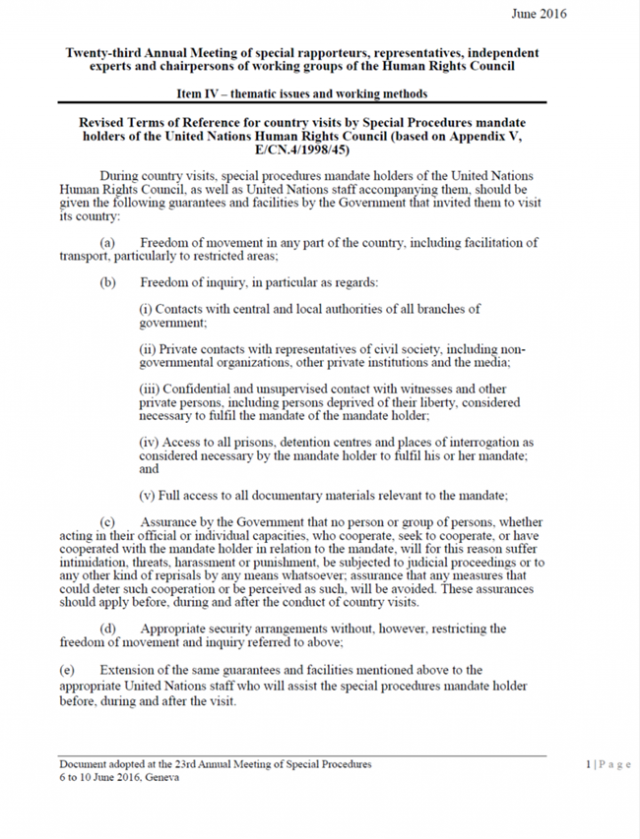Expert on slays accepts PHL invite, says probe will be on UN terms
The United Nations Special Rapporteur on extrajudicial executions has accepted the government’s invitation to investigate the killings linked to President Rodrigo Duterte's war on illegal drugs.
Contrary to the government's position that the terms of the visit must be negotiated by both sides, Agnes Callamard said her visit and probe would be in accordance with Terms of Reference already set by the United Nations.
Duterte has said that he wanted the UN to investigate the extrajudicial killings blamed on his administration but on the condition that he would be allowed to ask question to the rapporteur.
Such is not provided for in the Revised Terms of Refernece for country visits by Special Procedures mandate holders of the United Nations Human Rights Council.
"It is crucial for the effective implementation of the country visit that these Terms of References are fully accepted by Governments," Callamard said in a briefing note posted November 30.
"These are essential guarantees which ensure that the mission delivers on its outcomes, to the benefit of all those involved," she added.

This was contained in a letter to the Philippines on November
Callamard asked the Philippine government to agree to the “full accordance with the Terms of Reference for Fact-Finding Missions by Special Rapporteurs.”
“The visits of the Special Rapporteur, as those of all United Nations Human Rights Special Procedures, are governed by the Terms of Reference for Fact-Finding Missions by Special Rapporteurs, which governments are requested to fully accept for any visit to take place,” Callamard said.
The mandate of the Special Rapporteur on summary or arbitrary executions was established by resolution 1982/35 of the UN Economic and Social Council and recently renewed by resolution 26/12.
Philippine government officials said that after acceptance of the invitation, the Terms of Reference of the country visit are negotiated together “by practice” with the usual guarantees of free movement, security and non-reprisal.
It normally includes the scope, duration, places, and persons or groups or organizations to visit, the Department of Foreign Affairs said.
Duterte said he was open to a probe the murders, which has gripped the country since the outspoken Philippine leader declared a violent crackdown against illegal drugs, on condition that he is given the right to be heard and ask questions.
More the 3,000 has reportedly died since the 71-year-old Duterte came into office in June 30.
Despite his unrelenting policy against illegal drugs, Duterte continues to enjoy strong support in the Philippines and remains hugely popular.
Duterte, who has bristled at criticisms on his anti-drug war, added a specific additional element in the TOR that calls for the UN to make public its findings and for him to publicly ask questions on the report and present additional information or clarifications.
In her letter to the Philippine government, Callamard reiterated her interest to conduct a joint visit with the Special Rapporteur on the right to health, along with the organization of a joint expert consultation on drug control strategies and policies.
The objective of the joint visit, which normally lasts one to two weeks, “would be to examine issues related to the Special Rapporteur’s mandates and to identify good practices and challenges.”
It also seeks to identify “the most effective ways to assist the Philippines in guaranteeing the protection of the right to life and the right to health, particularly in the context of the anti-drug campaign.”
She explained that the Special Rapporteur’s inquiries into cases of unlawful killings or summary executions “are of a fact-finding nature only” and “not of a criminal, judicial or quasi-judicial nature.”
During their visits, Callamard said rapporteurs meet with government and other public officials at the national and local level.
The Special Rapporteur, as mandated by the UN terms of reference, also holds meetings with various non-governmental organizations, representatives of international or regional organizations, the diplomatic community, victims, witnesses, detainees, and the media.
A rapporteur also conduct visits to places of detention in the capital and relevant regions of the concerned country.
“By inviting the Special Rapporteur, the concerned government commits to ensuring free, confidential and unsupervised interviews with victims, families of victims, legal representatives, detainees, and civil society representatives as a whole, in accordance with the Terms of Reference for Fact-Finding Missions by Special Procedures,” Callamard said.
“They also commit to ensuring free and unrestricted access to all regions as well as to all places of detention and facilities where detainees might be kept,” she added.
The Special Rapporteur holds a high-level debriefing with the concerned government to discuss her preliminary findings and present her end of mission statement.
Afterwards, the rapporteur holds a press conference to share her initial observations with the media.
A report on the country visit is submitted to the following session of the UN Human Rights Council in Geneva.
It sets out analyses and impressions of the Special Rapporteur during the visit and makes recommendations to the government and other actors on upholding the right to life.
The concerned government is given a draft of the report for comments before its final submission. —NB, GMA News



